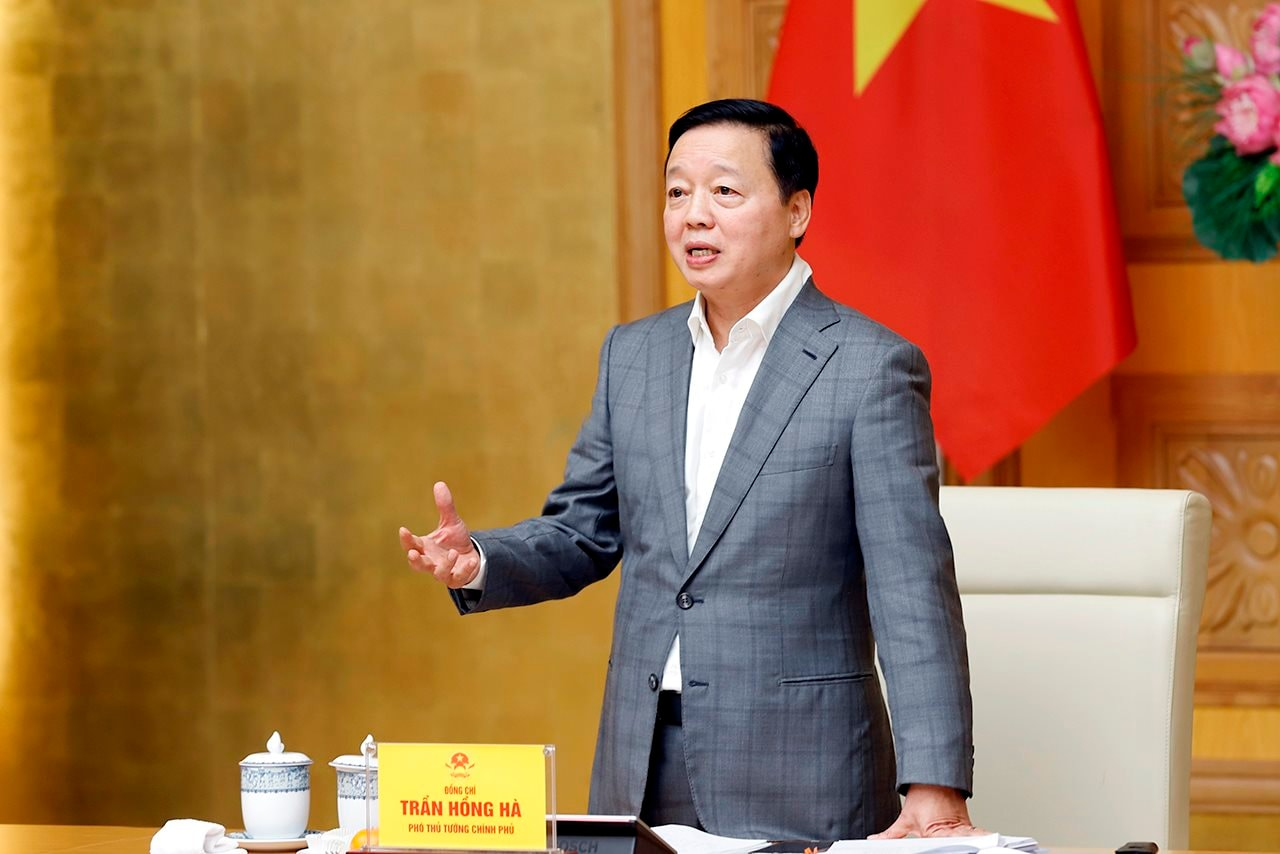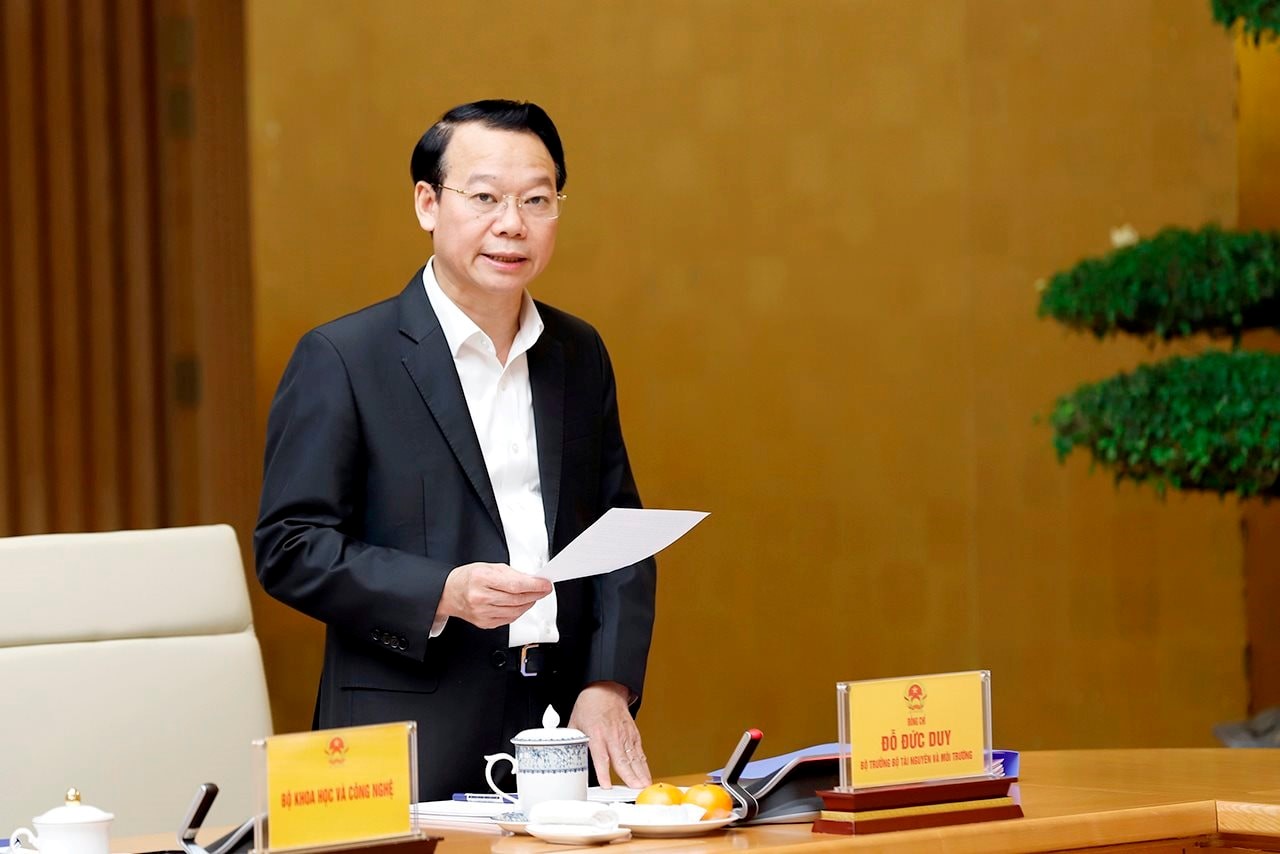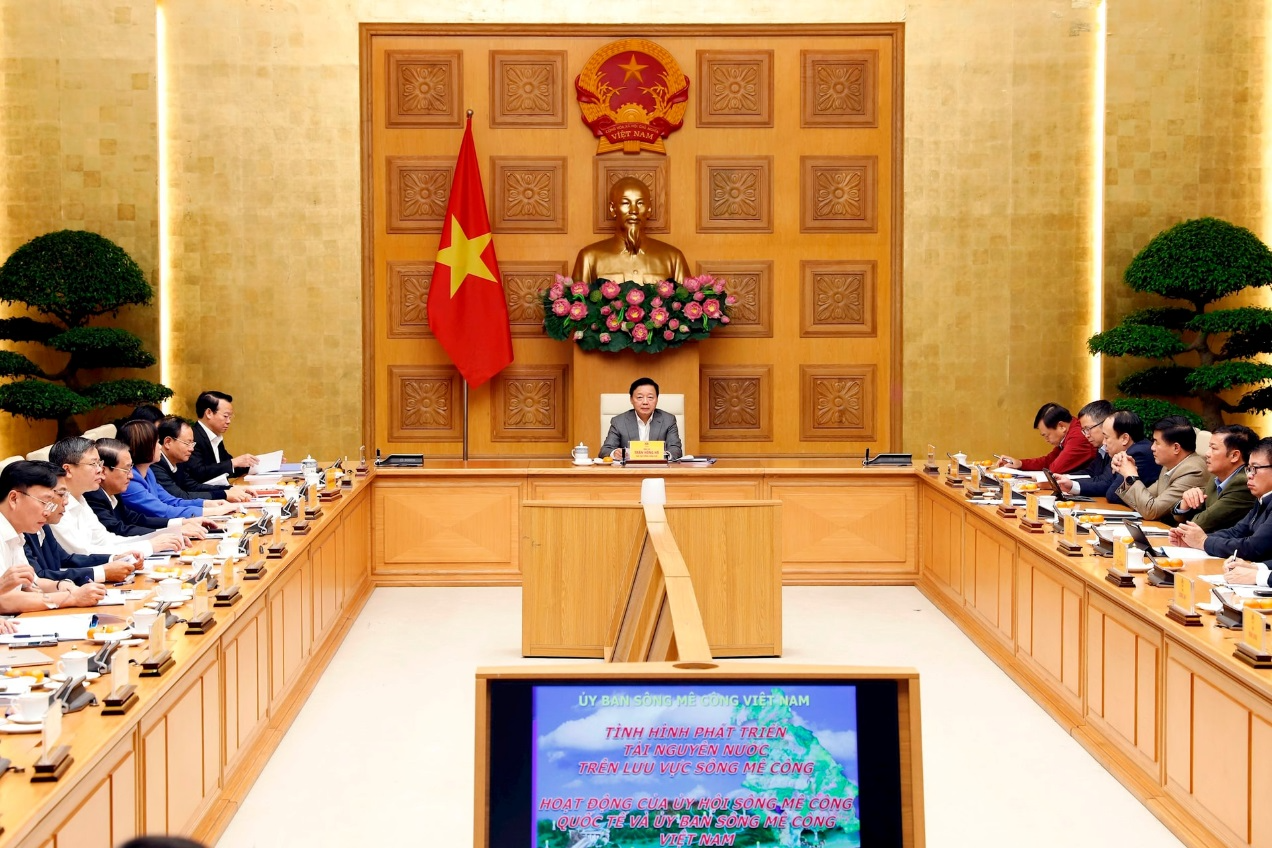This is the issue raised by Deputy Prime Minister Tran Hong Ha at the 2024 Plenary Meeting of the Viet Nam Mekong River Commission held on the afternoon of December 18.
The conference was held to promote coordination between central ministries, branches and localities in the Mekong Delta and the Central Highlands in the management and sustainable use of water resources in the Mekong River basin. Deputy Prime Minister, Chairman of the Viet Nam Mekong River Commission Tran Hong Ha chaired the conference.
The conference was also attended by Permanent Vice Chairman of the Viet Nam Mekong River Commission, Minister of Natural Resources and Environment Do Duc Duy. Vice Chairmen of the Viet Nam Mekong River Commission; members of the Viet Nam Mekong River Commission and leaders of the provinces: An Giang, Ben Tre, Ca Mau, Hau Giang, Long An, Soc Trang, Tien Giang, Vinh Long, Dak Lak, Dak Nong, Gia Lai, Lam Dong, etc.
 Deputy Prime Minister, Chairman of the Viet Nam Mekong River Commission Tran Hong Ha chaired the 2024 Viet Nam Mekong River Commission Plenary Meeting.
Deputy Prime Minister, Chairman of the Viet Nam Mekong River Commission Tran Hong Ha chaired the 2024 Viet Nam Mekong River Commission Plenary Meeting.Speaking at the Conference, emphasizing the important role of the Viet Nam Mekong River Commission in the international cooperation mechanism across the Mekong River basin, Deputy Prime Minister Tran Hong Ha asked the members of the Commission to frankly and comprehensively assess the Commission's operations in recent times, especially the requirement to innovate the organization and operating mechanism in the new context.
That is the emergence of many new cooperation mechanisms in the Mekong River basin (Mekong - Lancang, Mekong - United States, Mekong - Korea, Mekong - Japan, Ayeyawady - Chao Phraya - Mekong economic cooperation mechanism (ACMECS); ensuring water security on transboundary rivers entering Viet Nam; the whole country is implementing the arrangement and streamlining of the organization and apparatus with the principle of "1 job cannot be assigned to 2 people...".
According to the Deputy Prime Minister, in the new period, the Viet Nam Mekong River Commission must clearly define the mission, objectives and organizational model of a multi-sectoral, inter-local and inter-regional mechanism in the management and cooperation of Viet Nam's transboundary river basins. The ultimate goal is that not only the Mekong Delta, but also other transboundary river basins flowing through Viet Nam always share the best and most proactive water resources, avoid being passive, reduce the negative impacts and impacts from upstream exploitation and use activities, and climate change.
Speaking at the Conference, Minister of Natural Resources and Environment Do Duc Duy said that the Viet Nam Mekong River Commission is responsible for the cooperation activities within the framework of the International Mekong River Commission, a multilateral cooperation mechanism of strategic significance for Viet Nam.
 Minister Do Duc Duy said that the Viet Nam Mekong River Commission is a multilateral cooperation mechanism of strategic significance to Viet Nam.
Minister Do Duc Duy said that the Viet Nam Mekong River Commission is a multilateral cooperation mechanism of strategic significance to Viet Nam.At the Conference, through the moderation of Vice Chairman of the Viet Nam Mekong River Commission Do Duc Duy, delegates expressed their opinions on the current challenges within the management scope of each ministry, sector, and locality; inter-sectoral, inter-provincial, and inter-national issues; and proposed the role and responsibility of the Viet Nam Mekong River Commission in resolving difficulties and challenges to ensure effective management, exploitation, and protection of Mekong River water resources.
At the same time, propose priority orientations for the Commission's work program in 2025 and the next period, in accordance with practical requirements and sustainable development goals.
In addition, delegates also developed opinions to propose specific solutions to improve the operational efficiency of the Commission and the Standing Office, especially in the work of integrated river basin management and inter-sectoral and inter-local coordination.
Concluding the Conference, Deputy Prime Minister Tran Hong Ha emphasized that the activities of the International Mekong River Commission and the Viet Nam Mekong River Commission play an increasingly important role in the development of the Mekong River basin, with the attention, participation and contributions of major and developed countries in the world.
Pointing out the extreme impacts of climate change in the Mekong River basin, as well as transboundary rivers, are all related to water resources, the Deputy Prime Minister said that cooperation mechanisms, data sharing, establishment of a common monitoring system, consultation when implementing projects on the mainstream, investigation and assessment of the impact of upstream works on downstream... are of great significance to Viet Nam. In addition, the context of the situation is intertwined with ensuring water security, environmental protection, biodiversity... with geopolitical, economic and diplomatic interests and influences.
For central ministries and branches, the Deputy Prime Minister directed that they should continue to closely coordinate and promptly exchange and share with the Committee updated information on development plans in the basin within their respective ministries and branches, and propose cooperation initiatives, especially multilateral cooperation initiatives; proactively coordinate closely with the Committee to implement specialized tasks, focusing on monitoring and evaluating water resources developments and managing the exploitation and sustainable use of water resources in the Mekong River basin. The Deputy Prime Minister assigned the Ministry of Foreign Affairs to preside over matters related to bilateral and multilateral diplomatic cooperation mechanisms; the Ministry of Natural Resources and Environment to preside over matters related to technical research; the Ministry of Planning and Investment and the Ministry of Finance to preside over matters related to finance and investment in solutions and initiatives.
 Overview of the Conference on the afternoon of December 18
Overview of the Conference on the afternoon of December 18For localities in the Mekong Delta and the Central Highlands, the Deputy Prime Minister suggested proactively monitoring and assessing impacts from upstream, while closely coordinating with the Committee and ministries and sectors to develop and implement effective response programs to drought, saltwater intrusion, water resource depletion and inter-sectoral challenges. Localities also need to proactively share and inform the Committee about local issues, to discuss and jointly find appropriate and effective solutions.